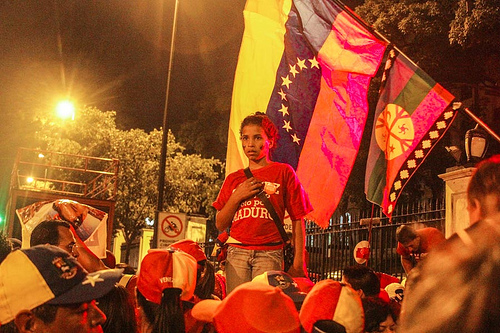Sol has a long journey to get to work every day, living in Junquitos, an hour’s bus drive into the mountains outside of Caracas.
On Sunday, the collectively-run café she works at was shut, but Sol was awake even earlier than usual. At 3a.m., she was helping to organise her local voting station and making sure people knew which table they were registered to vote at. By 8a.m., she was driving around in a car, looking for disabled or elderly people who might need help walking to their voting station. “Of course, we all need to vote,” Sol says, “they will not return.”
My younger brother had noted that with all their rhetoric and brimming with confidence, it was hard to remember that the opposition party have never won a presidential election here. However, for many Venezuelans, they have won, and were winning for the 40 years of punto-fijismo, or “pacted democracy” that prevailed before Hugo Chavez first came into power in 1998. So “no volveran,” or “they will not return,” has been a commonly-heard phrase in recent days.
Sobhan, an eldery man, was born in Guyana, but has lived in Venezuela for many years. I notice the ubiquitous purple-ink stained on his little finger that afternoon, one of seven measures imposed by the CNE [National Electoral Council] to ensure the security of the vote. “I voted for us,” Sobhan tells me, a careful smile lighting up his features.
More than elections
These are more than political elections that take place in Venezuela. To realise that, you only needed to visit Avenida Urdaneta and the approach to Miraflores, the presidential palace, in the hours leading up to the announcement of results.
The voting tables had officially closed at 6p.m., and it was clear that millions had gone out to vote for both Nicolas Maduro, Hugo Chavez’s appointed successor, and Henrique Capriles, his wealthily-backed electoral opponent.
But that evening, just like at previous elections, it was a sea of government supporters that had flooded the streets. Here, perhaps, was a contradiction of the Venezuelan system. The elections, undoubtedly clean, had been carried out with calm and without fear, in perhaps one of the most democratic systems in the world.
However, with a couple hours still to go before results would be announced, a party atmosphere had descended on Avenida Urdaneta. I couldn’t help to wonder, where would these people go if Capriles were to be announced winner? They had travelled from the barrios, they had struggled for many years, they had received homes, education and medicine when they had none before. Would they really just lay down and die for an election result?
“Look, we’ve already got experience of the electoral process,” says Yennetor, a woman in her forties. “We have a process that is well organised. We went out to vote with a political commitment, but also with a moral and sentimental commitment to Commandante Chavez. So there is a feeling of sadness, but we are in the streets right now to show the opposition that we are taking care of Miraflores, because for us Miraflores is a symbol of our participative democracy.”
Result closer than expected
At 11p.m., Nicolas Maduro was announced as the next President of Venezuela. The name didn’t surprise me, but the figures certainly did. Both candidates had received over seven million votes, with a participation rate of 78 per cent. Maduro had received around 600,000 votes less than Chavez in the October elections, and Capriles had received around 700,000 more than he had last time round. Maduro had won the elections by less than two per cent.
However, whereas Chavez, winning in October by a significant landslide, had spoken from the “balcony of the people” in Miraflores, in the middle of the night, to speak of dialogue, unity and tolerance, Maduro, winning by far less than expected, was in a far more victorious mood.
Nevertheless, underneath the bravado, he must be realising the task that now faces him. Of course, as the government quickly pointed out, they had accepted an electoral defeat, their only electoral defeat, in 2007, of just 0.1 per cent, but you could not mistake the tension in the air.
Capriles waited for little over an hour before calling a press conference. His face was full of anger, his voice seething with rage. He had refused to commit to recognising the results of the election beforehand, as had every other presidential candidate, and now he was making good on his threat. He accused Maduro of losing the elections, and demanded that a re-count be held.
The Venezuelan presidential elections took place on April 14, 2013. Eleven years earlier, on the very same date, Hugo Chavez landed at Miraflores in a helicopter after nothing short of a popular uprising had demanded his re-instatement to power after a coup d’etat of just seventy-two hours crumbled and fell.
There is much at stake in Venezuela; the oil interests of imperialist powers, the homes of the poor majority, and the elites who lost their grip on power almost fifteen years ago. Too much to be lost or won in a single day.
Jody McIntyre is a journalist, author and political activist. He has written for the the New Internationalist, The Independent, The Guardian, The Observer, Al Akhbar English, the New Statesman, Electronic Intifada and Disability Now. He was Guest Editor for the October 2012 issue of the New Internationalist. He is also the co-director of a forthcoming documentary on the Venezuelan ‘Hip-Hop Revolucion’ movement with Pablo Navarrete. For updates, please follow @JodyMcIntyre.
Photo: Ewan Robertson / Venezuelanalysis.com



